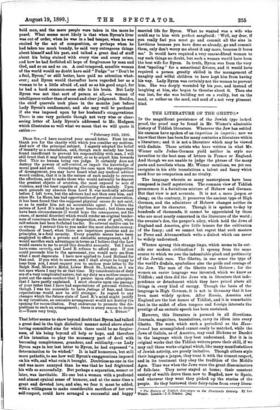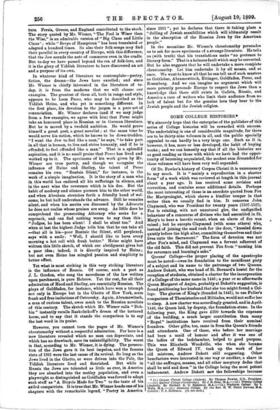THE LITERATURE OF THE GHETTO.*
Jr the magnificent persistence of the Jewish type lacked proof, the proof may be found in Mr. Wiener's admirable history of Yiddish literature. Wherever the Jew has settled hie enemies have spoken of an irnperium in imperio ; now we know that there has been for many centuries a literature within a literature; and it is not a literature which may be viewed with disdain. Those artists who have written in what Mr. Wiener calls Judeo-German yield neither in style nor invention to the best men of letters in France or England. And though we are unable to judge the phrase of the many poets and novelists whom Mr. Wiener mentions, we yet can recognise in his able translations a talent and fancy which need fear no comparison and no rivalry.
The language wherein so many masterpieces have been composed is itself mysterious. The common view of Yiddish pronounces it a fortuitous mixture of Hebrew and German. But that view is not accurate. It is not a mere jargon or slang; on the contrary, it preserves the ancient type of High German, and the admixture of Hebrew changes neither its rhythm nor its character. Though it is spoken to-day by hundreds of thousands, it cannot be appreciated by those who are most nearly concerned in the literature of the world ; the sweater's den, the pauper's alley, which hold the Jews of England and America, give little leisure for the cultivation of the fancy; and we cannot but regret that such masters as Perez and Abramowitsch write a dialect which can never be widely understood.
Whence sprang this strange lingo, which seems to lie out- side our modern civilisation ? It sprang from the same source to which we owe the indomitable pluck and pertinacity of the Jewish race. The Ghetto, in one sense the type of the world's disdain, symbolises also the pride and courage of the Jew. The men of the Ghetto read Hebrew ; for the women an easier language was invented, which we know as Yiddish; and thus did the Jews win in literature that inde- pendence or detachment which they have prized above all things in every kind of energy. Though the basis of the language is High German, it is not in Germany that it has been most widely spoken. After Russia, America and England are the last homes of Yiddish, and it is remarkable that in the midst of alien tongues and foreign interests the prestige of an esoteric speech has been sustained.
However, this literature is pursued in all directions. Journals, magazines, translations, carry its idiom into every Ghetto. The work which such a periodical as the Haus- freund has accomplished cannot easily be matched, while the Jews of Galicia, as of America, may read Dickens or Daudet in the language which they best understand. But it is in original works that the Yiddish writers prove their skill, if we may call those works original which, like many manifestations of Jewish activity, are purely imitative. Though others style their language a jargon, they treat it with the utmost respect, and in its treatment they obey the tradition of the Middle Agee. Time was when the Jews were the great disseminators of folk-lore. They never stayed at home; their constant anxiety of wealth drove them now to Bagdad, now to Spain, and wherever they went they picked up the stories of the people. So they borrowed their fairy-tales from every litera- * The History of Yiddish Literature in the Nineteenth Century. By Leo Wiener. London T. C. Nionuo. ps.1
tare. Persia, Greece, and England contributed to the stock. The story quoted by Mr. Wiener, "The Fool is Wiser than the Wise," is an admirable version of "Big Clans and Little Claus ; while " Bevys of Hamptorna " has been translated or adapted a hundred times. So also their folk-songs may find their parallel in every country of Europe, with this difference, that the Jew sounds the note of commerce even in the cradle. But to-day we have passed beyond the era of folk-lore, and it is the glory of Yiddish literature to have discovered an art and a purpose of its own.
In whatever kind of literature we contemplate—poetry, fiction, the drama—the Jews have excelled ; and since Mr. Wiener is chiefly interested in the literature of to- day, it is from the moderns that we will choose our examples. The greatest of them all, both in range and style, appears to be Leon Perez, who may be described as the Yiddish Heine, and who yet is something different, in the first place, his devotion to the jargon is a pure act of renunciation. Mr. Wiener declares (and if we may judge from a few examples, we agree with him) that Perez might take an honoured place in Russian or in German literature. But he is moved by a twofold ambition. He would prove himself a great poet, a great novelist ; at the same time he would serve his nation, which he knows to be down-trodden. "I want the Jew to feel like a man," he says, "to take part in all that is human, to live and strive humanly, and if he is offended, to feel offended like a man." That is a splendid aspiration, and it is no small praise that Perez has lived and worked up to it. The specimens of his work given by Mr. Wiener are true poetry, and though we recognise the influence of Heine and Shelley, the talent of Perez remains his own. " Bontsie Silent," for instance, is the work of a'simple imagination. It is the story of a man who in this world has endured all his sufferings in silence, and in the next wins the reverence which is his due. Brit the habit of modesty and silence pursues him to the other world, and when Abraham stretches forth a friendly hand of wel- come, he but half understands the advance. Still he remains silent, and when his merits are discussed by the Advocate he does not realise whose praises are sang. As little does he comprehend the prosecuting Attorney who seeks for a reproach, and can find nothing worse to say than this : "Judges, he has been silent! I shall be silent too." And when at last the highest Judge tells him that he can take all —that all is his—poor Bontsie the Silent, still perplexed, says with a smile : "Well, I should like to have every morning a hot roll with fresh butter." Heine might have written this little sketch, of which our abridgment gives but a poor idea ; indeed, it is directly inspired by Heine ; but not even Heine has mingled passion and simplicity to better effect.
Yet what is most striking in this very striking literature is the influence of Russia. Of course, such a poet as J. L. Gordon, who sang the sacredness of the law written upon parchment, is pure Hebrew. Yet the rest, for all their admiration of Hood and Shelley, are essentially Russian. The plays of Goldfaden, for instance, which have won a triumph not only in Europe but in the Ghetto of New York, seem frank and free imitations of Ostrovsky. Again, Abramowitsch, a man of curious talent, owes much to the Russian novelists of this century. The sketch which Mr. Wiener calls " Dob- bin " instantly recalls Raskolnikoff's dream of the tortured horse, and to say that it stands the comparison is to say the last word in its praise.
However, you cannot turn the pages of Mr. Wiener's chrestomathy without a respectful admiration. For here is a new literature revealed which no man can depreciate, and which has no drawback, save its unintelligibility. The worst is that, according to Mr. Wiener, it is dying. The persecu- tion of the Jews gave it its best impetus, and the famous riots of 1881 were the last cause of its revival. So long as the Jews lived in the Ghetto, or were driven into the Pale, the Yiddish literature lived and flourished. But while in Russia the Jews are tolerated as little as ever, in America they are absorbed into the motley population, and even a playwright so distinguished as Goldfaden was forced to adapt such stuff as "A Bicycle Made for Two" to the taste of his exiled compatriots. It is true that Mr. Wiener heads one of his chapters with the remarkable legend, "Poetry in America since 18S1 " ; yet he declares that there taking pleat) a "dulling of Jewish sensibilities which will ultimately result in the absorption of the Russian Jews by the American people."
In the meantime Mr. Wiener's chrestomathy persuades us to ask for more specimens of a strange literature. He tells us (with truth) that his translations make "no pretence to literary form." That is a heinous fault which may be corrected. But he also suggests that he will undertake a more complete cbrestomathy. Let him undertake it by all means, and at once. We want to know all that he can tell us of such masters as Gottlober, Abramowitsch, Ettinger, Goldfaden, Perez, and Rosenberg. And we can imagine no argument which will more potently persuade Europe to respect the Jews than a knowledge that there still exists in Galicia, Russia, and America a race of writers who limit their audience from no lack of talent but for the genuine love they bear to the Jewish people and the Jewish religion.



































 Previous page
Previous page